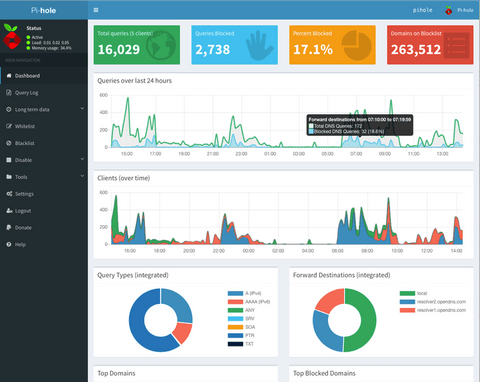
Pi-hole PiJuice Edition - The Network-Wide Ad Blocker
Sign up for restock notifications
Pi Supply and Pi-hole have partnered together to bring you the Pi-hole Ad Blocker PiJuice edition - a device that allows you to block all of those annoying advertisements on the internet. PiJuice is an uninterruptible power supply which means if you experience a power cut the onboard battery will kick in to keep the Raspberry Pi and the Pi-hole software running! Since Pi-hole works at the DNS level, ads can be blocked on any device and even in apps.
Kit contains
- Raspberry Pi
- PiJuice HAT
- PiJuice - Short Case
- Pi-hole 16GB SD Card Image
- Red Ethernet Cable - 1m
- Official Raspberry Pi Power Supply (Black/White)
- HDMI Cable
PiJuice Features:
- Onboard 1820 mAh off the shelf Lipo / LiIon battery for ~4 to 6 hours in constant use! (with support for larger Lipo Battery of 5000 or 10,000 mAH+ to last up to 24 hrs +)
- A Full Uninterrupted / Uninterruptible Power Supply solution.
- Designed for the Raspberry Pi A+, B+, 2B, 3B and 3B+ but also compatible with Raspberry Pi Zero v1.3 and Raspberry Pi Zero Wireless.
- Integrated Real Time Clock
- Onboard intelligent on/off switch
- Low power deep-sleep state with wake on interrupt/calendar event
- Programmable multi-colored RGB led (x2) and buttons (x3) with super simple user-configurable options
- Hardware watchdog timer to keep your Raspberry Pi on and working in mission-critical remote applications
- Full power management API available to Raspberry Pi OS with auto shutdown capability when running low on batteries
- Raspberry Pi HAT compatible layout, with onboard EEPROM for easy plug and play operation
- Enhanced graphical user interface (GUI) available for easy install (via APT)
- Customisable scripts for enhanced flexibility and full report of battery status
- All GPIOs available via stackable header for ease of expandability and connectivity
- Charge via on-board micro USB or via the Raspberry Pi micro USB (or from onboard pin headers)
- Batteries can be charged from different type of sources and voltages
- Replace the battery without downtime. Compatible with any single cell LiPo or LiIon battery
- Fully CE and FCC tested design. Battery safety tested also.
Block Over 100,000 Ad-serving Domains
Known ad-serving domains are pulled from third party sources and compiled into one list.
Block Advertisements On Any Device
Network-level blocking you to block ads in non-traditional placed such as mobile apps and smart TVs, regardless of hardware or OS.
Improve Overall Network Performance
Since ads are blocked before they are downloaded, your network will perform better.
Reduce Cellular Data Usage
Pair your Pi-hole with a VPN for on-the-go ad-blocking and save on data costs.
Monitor Performance And Statistics
The Web interface shows how many ads were blocked, a query log, and more.

API
Utilize Pi-hole’s API in your scripting or programming projects.
{
"domains_being_blocked":243038,
"dns_queries_today":2385,
"ads_blocked_today":414,
"ads_percentage_today":17.35849,
"unique_domains":429,
"queries_forwarded":1537,
"queries_cached":434,
"clients_ever_seen":5,
"unique_clients":5,
"status":"enabled"
}
Use Pi-Hole As Your DNS Server
Configure your router’s DHCP options to force clients to use Pi-hole as their DNS server, or manually configure each device to use the Pi-hole as their DNS server.

If your router doesn’t let you change these settings, you can use Pi-hole’s built in DHCP server to achieve the same effect.

Block Ads Everywhere
Since Pi-hole works at the DNS level, ads can be blocked on any device and even in apps.
Setup Guides
We're creating a number of guides and tutorials on how to get up and running with Pi-hole. Please visit the link below to see these:- Pi-hole setup guide
- Please note: The kit requires a HDMI monitor and mouse & keyboard for the initial setup
PiJuice Technical Information
- The EEPROM can be disabled and its I2C address changed for increased compatibility with other boards
- BP7X battery - original battery from Motorola Droid 2 (A955) - 1820mAh battery
- Microcontroller is an ST Micro STM32F030CCT6 ARM Cortex-M0, 48MHz, F64KB, R8KB, I2C, SPI, USART, 2.4-3.6V
- Charge IC - BQ24160RGET Charger IC Lithium-Ion/Polymer, 2.5A, 4.2-10V
- Fuel gauge IC - LC709203FQH-01TWG Battery Fuel Gauge, 1-Cell Li-ion, 2.8%
- EEPROM - CAT24C32WI-GT3 EEPROM, I2C, 32KBIT, 400KHZ, 1V7-5V5
- Optional spring pin - Mil-Max 0929-7-15-20-77-14-11-0
- Compatible with any 4 pin battery on board that can be used with 00-9155-004-742-006 battery contacts from AVX including the BP7X, BP6X, and any compatible batteries including the 1600mAh and 2300mAh ones from CameronSino (CS-MOA853SL and CS-MOA855XL)
- There is an on board 4 pin screw terminal block for larger off board batteries. Any single cell LiPo / LiIon is compatible. However, you use your own sourced battery at your own risk. We HIGHLY RECOMMEND using a battery with an internal protection circuit and a NTC (temp sensor)
- Optional header for offboard button - connected to same output as SW1
- 6 pin breakout header - with two GPIO from the ARM Cortex-M0, Vsys, 5v0, 3v3, GND connections
- Header for optional off board solar panel / wind turbine etc.
- Optional RF Shield attachment - Harwin S02-20150300 (can also double as an inexpensive heatsink)
- Input voltage range - 4.2V 10V
- Output voltage - 3.3V and 5V
- Output amperage - maximum current at 5V gpio is 2.5A and at VSYS output 2.1A, but also this depends heavily on battery capacity. For BP7X have measured around 1.1A at 5V GPIO and around 1.6A at VSYS output. Obviously, this also depends heavily on the current draw demanded by the Raspberry Pi/device itself. To achieve a maximum of 2.5A it will need battery over 3500mAh.

